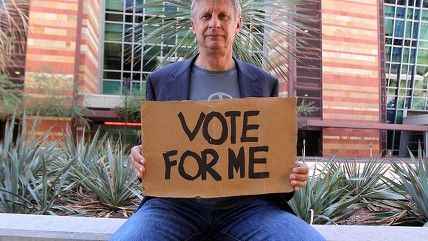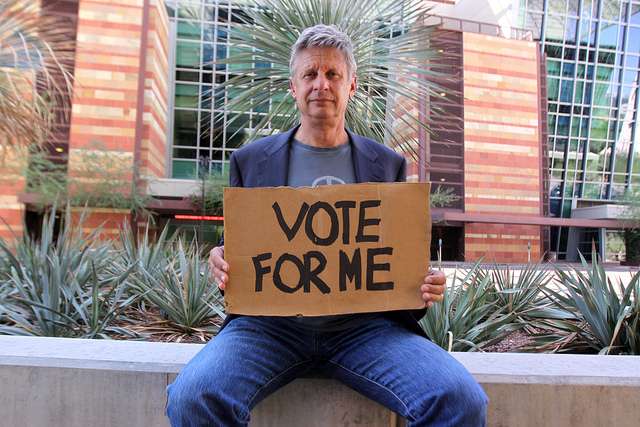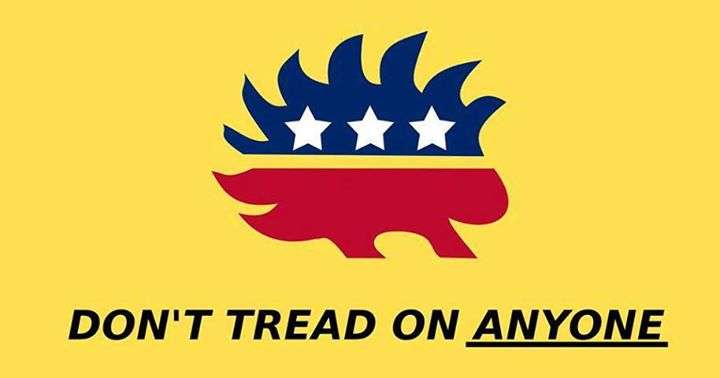How Donald Trump & Hillary Clinton Have Made the Libertarian Party Relevant
Will the LP take advantage of voter hate for Trump and Clinton to finally present a viable alternative?

Donald Trump and Hillary Clinton, the likely presidential nominees of America's two major political parties, would be among the best-known and most-disliked candidates in history. What better time for the Libertarian Party (LP), the only third party that will be on all 50 states' ballots, to make its move into the mainstream?
Reason spoke with a number of senior LP officials, party supporters, and philosphical fellow travelers about the unique opportunity presented by the 2016 election. Though all agreed the LP was in a great position to present a distinct political platform through a legitimately viable candidate, some were more optimistic than others about the prospects for success, or even by what measure success could be determined.
Is the goal the White House, or just altering the national conversation by getting on the main debate stage? The LP knows voters want an alternative, but the party continues to struggle with its sales pitch and structural realities of a two-party system that marginalizes alternative choices.
The LP's three most prominent candidates,

including former New Mexico Gov. Gary Johnson (who served two terms as a Republican and was the LP's presidential nominee in 2012), squared off in a debate-style forum hosted by Fox Business Network's John Stossel, which airs tonight at 9 P.M. ET. As the distant third-place finisher in 2012, Johnson scored about 1 percent of the popular vote and set an LP record of more than 1 million votes.
A recent Monmouth University poll put Johnson at about 11 percent in a three-way race against Trump and Clinton, which probably says as much about Johnson's viability as it does about how nauseated voters are by the two leading major-party options.
But with the electorate expressing profound antipathy toward their two likely choices for president, is the 2016 election the capital-L Libertarian moment we've been waiting for? Or will this be another wasted opportunity by a third party to make inroads with voters who are increasingly sympathetic to libertarian principles, even if they prefer not to officially identify with the party?
"The biggest thing that stops people from voting Libertarian is inertia," Nicholas Sarwark, the LP's Chair, told Reason in a phone interview. "They haven't tried it before, but once they do, they'll find out the sky doesn't fall." He likens the conventional wisdom that any vote which strays from the two-party system is a waste to the scene in Ghostbusters when the heroes are compelled to choose the form of their destructor.
If Trump or Clinton are the Stay-Puft Marshmallow Man of this analogy, Sarwark says the LP's candidate, who will be nominated in the party's May convention, will present an alternative philosophy that rejects the default war-mongering of both the Democratic and Republican parties. According to Sarwark, the LP's outreach is focused on spreading a positive message focused on encouraging people to embrace the "beautiful feeling of voting for what you believe in, and not against what you hate more."
The LP's Executive Director Wes Benedict told Reason that the combination of Sen. Rand Paul (R-Ky.) dropping out of the GOP race and the ascension of Donald Trump has led to a spike in Libertarian Party membership. From what he's observed in the comments left by new party members, Benedict believes a good deal of the boost is motivated by fears that a Trump presidency would lead to closed borders and a trade war with China.
When it comes to social issues, the LP's Political Director Carla Howell calls Democrats and Republicans "Johnny Come Latelys" regarding gay marriage and criminal justice reform. Howell told Reason that the LP "would love it if [the Democrats and Republicans] co-opted our issues, but they usually don't." She added that while Republicans talk a good game when they're running for office, "they don't substantively reduce government" once they're there, and the Democrats have never shown a true interest in "disentangling the United States from the Middle East."
A frequently deployed trope about third-party candidacies is that they act as spoilers, siphoning votes from one of the major parties and handing the election over to the other. The pathologically polite former President George H.W. Bush can barely bring himself to mention Ross Perot's name decades after the Texas oil billionaire garnered almost 19 percent of the popular vote in the 1992 Presidential Election won by Bill Clinton. Likewise, the name Ralph Nader burns like hot fire on the lips of Democrats who blame the consumer advocate for depriving former Vice President Al Gore of the presidency in 2000 and handing it to George W. Bush. In 2013, many Republicans blamed Libertarian attorney Robert Sarvis for tipping Virginia's gubernatorial election towards Democrat Terry McAuliffe.
But Sarwark says this perception is wrong, insisting that exit polls showed that Sarvis pulled more votes away from traditionally Democratic-leaning voters than from Republican Ken Cuccinelli, who he says was a "terrible candidate."
Sarvis himself tells Reason in a phone interview that he also rejects "the premise that any candidate is a spoiler, but added that he would love it if a strong LP presidential candidate caused a 'major party candidate to flameout," which he said could be a "tipping point" in American electoral politics.
David Boaz, the executive vice president of the libertarian Cato Institute, says that his expectations of an LP candidate being successful against two major-party candidates as loaded with baggage as Trump and Clinton are tempered by the fact that he's seen third parties fail time and time again at making a significant impact on a national level.
Boaz, who worked on various LP campaigns decades ago, says that while Gary Johnson polling at 11 percent is an encouraging sign, "as you get closer to the general election, it's very hard to persuade people to vote for a candidate they think has no chance of winning."
He thinks Johnson's full-throated support for marijuana legalization, if marketed correctly, could draw in a good amount of young people who currently support Sen. Bernie Sanders' (I-Vt.) campaign for the Democratic nomination. Sanders pledged to push for the federal decriminalization of marijuana, and supports the right of states to opt for full legalization if they so choose. That has also polled very well among young people.
Richard Winger, an attorney and the publisher of Ballot Access News, thinks the biggest hurdle facing the Libertarian presidential candidate is a lack of public visibility. Winger tells Reason that when former Rep. Ron Paul (R-Texas) ran as the Libertarian nominee in 1988, the New York Times paid him no mind, but the fact that the Gray Lady prominently profiled Gary Johnson last month is proof that "things are changing." He says Republicans in particular are coming to the "sudden shocking realization" that their party is "having a terrible problem and therefore people are interested in looking for alternatives."
Winger, who donates his time and legal skills to fight local and state governments' overbearing restrictions that frequently deny alternative parties the ability to get on the ballot, thinks getting the Libertarian candidate on the debate stage with the Democrat and Republican candidates "would do the trick" at helping to convince the public that the two major parties are out of touch and not serving their interests.
Currently, candidates are required to be polling at least 15 percent nationally to

make it to the general election's main debate stage. But Winger points to the lawsuit filed by the Libertarian and Green parties against the Commission on Presidential Debates, which argues that the entity illegally colludes with the two major parties to keep out the competition, as a crucial hurdle that could remake the American political system.
Whether getting a viable Libertarian candidate such as Johnson on the stage with Trump and Clinton is enough to level the playing field is uncertain. As Cato's Boaz notes, convincing a majority of voters that a third-party ballot is anything other than a wasteful protest is something that has not yet ever been achieved.
What is indisputable is that neither of the two major parties can sell themselves as a party that is reliably anti-war and pro-personal freedom.
The LP's Sarwark references a South Park episode to drive home that point. If voters can "let go of the fear" that the only two choices they have are between "the giant douche and the turd sandwich," he says, they might actually get a president committed to the philosophy of "don't hurt people and don't take their stuff."


Show Comments (167)